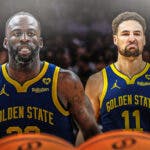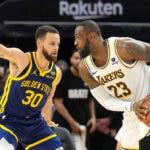There's only one Draymond Green. No player in basketball combines more unique strengths with obvious weaknesses than the four-time NBA champion, all of which can be maximized and minimized depending on not just quality of opponent and circumstances of time and score, but the team-wide ecosystem he's playing in.
Green's overall value doesn't exist in a vacuum, but that hardly means it's difficult to deduce.
The Golden State Warriors' suffocating postseason defense hinged on Green more than anyone or anything else. Their defensive rating was a whopping 9.0 points stingier with him on the floor, per Cleaning the Glass, an elite number accomplished by Green extinguishing fires all over the floor and preventing them from raging in the first place.
Green remains an exceptional switch defender in his early 30s. Steve Kerr's decision to toggle the matchups after Game 1 and make him Jaylen Brown's primary defender for extended stretches marked a turning point in the NBA Finals. But the notion that Green's otherworldly defensive impact is tied directly to switching is wildly outdated, and a disservice to his all-around genius on that side of the ball.
Golden State switched plenty during its championship run—some would argue too much. Its airtight defense didn't spring from Stephen Curry's surprising stoutness in would-be mismatches or Jordan Poole's marginal improvement under that duress throughout the course of the playoffs, though. What really drove the Warriors' sustained success on that side of the ball is Green's ability to do literally whatever they needed, whenever they needed it.
How many players in the league could load up to the strong side while avoiding a three-second violation, call out a coming flare screen in the opposite corner, then apparate on the flight of the ball for a blocked three-pointer—after forcing the pass on initial penetration?
Space is paramount to successful NBA offense, and no defender manipulates it like Green. He's constantly winning numbers deficits, rendering offensive advantages moot with decisive nuance.
Green plays two in pick-and-roll defense better than anyone in league history.
Look how he jabs toward the ball as Jaylen Brown splits Curry in the initial action, coaxing Boston's star into an awkward lob attempt just in time to retreat into the legs of Robert Williams III.
Even when he's beaten, Green is never out of the play.
He knew Kevon Looney would be there to trap the box well before getting beaten baseline by Tatum, goading the Celtics young superstar into a turnover by immediately peel switching onto Williams.
Surrounded by the likes of Andre Iguodala, Klay Thompson, Shaun Livingston and Andrew Bogut at the beginning of the Warriors' dynasty, it was easy to conflate Green's defensive excellence with that of his team's at large. Not anymore. His subsequent track record and peerless influence throughout 2022-23 cement what's long been clear to anyone really paying attention.
Green is Golden State's defense, just like Curry on the other side of the ball. It's not unreasonable to suggest he could lift any team, irrespective of personnel and schematic preferences, to above-average defense in the playoffs.
Green would definitely be worth the max-level contract he reportedly wants based on that reality alone. But his presence provides endless ripples on offense just like it does defensively, albeit toward the other extreme.
“Green, according to sources, wants and believes he deserves a maximum contract extension from the Warriors. Aug. 3 is when he is eligible to sign a four-year deal. That is his desired length.”
Could there be trouble in paradise for the Warriors 👀
(via @TheAthleticNBA) pic.twitter.com/uYSLU93kKc
— ClutchPoints (@ClutchPointsApp) July 27, 2022
Kerr famously benched Green midway through the fourth quarter of the Warriors' pivotal Game 4 victory at TD Garden, rolling with Poole and Kevon Looney for a several-minute stretch that included early crunch time. He was back on the floor for the finish, grabbing a key offensive rebound and finding Looney for a dump-off layup after catching on the short roll.
Still, it wasn't any secret why Kerr sent Green to the bench as his team's title chances hung in the balance. The Celtics had been daring Green to shoot and chew up space off the dribble throughout the Finals, yielding a hideous collection of clanked jumpers, hopeless forays to the rim and unforced turnovers.
Draymond Green averaged 6.2 points per game against Boston, shooting 43.5% in the paint and 2-of-16 from beyond the arc. He got better offensively once Kerr curtailed his responsibilities, running less offense through Green from the top of the floor and encouraging him to exploit space on the catch by immediately charging into dribble hand-offs and quick-hitting ball screens rather rather than look for his own shot.
The data aligns with the eye test, too. Golden State's offensive rating against the Celtics was 112.3 with Curry and Green on the floor, but dipped all the way down to a putrid 90.9 when the reigning Finals MVP was on the bench, per NBA.com/stats. Green's impressive assist numbers decreased considerably without Curry, and he shot even worse from the floor.
It's not especially damning by itself that Green's offensive utility in the Finals was tied to Curry. The Warriors have never managed league-average offense with Curry on the bench during the Kerr era, even when Kevin Durant was playing in The Bay. No player in the league makes life easier on his teammates offensively than Curry, and it's not close.
But players like Durant, Wiggins, Thompson and Poole don't depend on Curry's unmatched gravity the way Green does. He much more closely aligns with Looney and the departed Gary Payton II in that respect, with Curry magnifying effects of Green's passing and screening chops while curbing reverberations of his shooting and finishing woes.
Draymond Green wouldn't be in position to make these ridiculously high-level playmaking reads if Curry wasn't the most dangerous on-ball shooter and off-ball mover in NBA history.
What happens to Green as a short-roll playmaker when he's not running screening action with a guard who commands two defenders on the ball? How many of the passing windows he normally hits would vanish if Green is playing for a team that doesn't derive by far the highest share of its offense from cuts? Would he really be such a devastating transition engine without shooters like Curry, Thompson and Poole trailing behind him to wreak defensive panic?
The answers are obvious, and indicate as much about Green's value to the Warriors as they do any other team in basketball.
Draymond Green deserves another max contract from Golden State based both on what he's already done for the franchise and the prospect of more championship glory to come. But if management balks at his desired parameters for an extension next week or a new contract next summer, he can't count on that hard-earned financial value following him to the open market.
He's just not a max-level player for any team but the Warriors.
Green's past accomplishments don't carry the same clout with the rest of the league, and at 32 years old, he's clearly on the downside of a career that's been propped up by perhaps the greatest offensive player of all time. Those acknowledgements take nothing away from Green's exalted place in the league's historical defensive hierarchy nor add a caveat to his Hall-of-Fame bonafides.
But given the inevitably fraught nature of forthcoming contract negotiations with the Warriors, the notoriously proud Draymond Green would nevertheless be wise to keep them in mind should he eventually threaten to take his talents elsewhere.




